Agritourism means travel organized around farming, small-scale food production or animal husbandry. Visiting a working farm or ranch for the purpose of enjoyment and education are key parts of this often rural experience. Farmer's markets, wine tourism, cider houses and corn mazes all constitute examples of agritourism. Travelers who participate in this type of vacation frequently desire to see how food is grown and prepared or to learn how animals are raised.
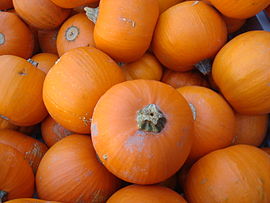
Understand
edit| “ | The small landholders are the most precious part of a state | ” |
—Thomas Jefferson | ||
Sometimes spelled "agrotourism," agritourism is the idea of bringing urban residents to rural areas for leisure travel and spending.
In an increasingly mechanized world, many people have lost touch with how their food is produced, or the region where it originated. Agritourism offers tourists a chance to reconnect with the land, providing a "hands on experience" with local foods. Agritourism activities include picking fruits, tasting wine, tending bees, milking cows and other educational pursuits.
Agritourism immerses visitors in the heritage of a particular culture. Take the time to stop by a working farm or ranch, you will most likely discover people with an intimate knowledge of the history and traditions of their region. A traveler to Agros in Cyprus who helps the villagers gather roses in May, will learn something about the area's history producing rose water. Horseback riding on a dude ranch in Montana offers a glimpse into the lives of cowboys from the "Old West" of the U.S.. A visit to a food museum such as the Musee de la Boulangerie Rurale in Luberon can teach about the history of rural breadmaking in the Provence region of France.
For the most iconic agritourism areas, safeguarding the integrity of their products is nothing less than a source of national pride. In the European Union, Protected Designation of Origins (PDOs) look after the integrity of a wide variety of foods, such as Champagne wine in France, Asiago cheese in Italy and Melton Mowbray meat pies in England. All these regions are eponymous with the foods they produce, while a tourism industry has sprung up around that particular food's production.
Like sustainable travel, agritourism focuses on travel that is low-impact and empowering to local communities, both socially and economically. Recognizing the need to diversify their farm products and supplement their agricultural incomes, many farmers consider agritourism as a viable option for the long-term sustainability of their farms. Agritourism can prop up an agricultural economy when local producers can no longer compete economically. The tourism takes place in a farm setting and is secondary to the primary agricultural operation.
Overnight stays
editThis can be as sophisticated as a bed and breakfast stay at a winery or as rustic as camping. One common variation is a farm stay, where guests help feed the animals and harvest the crops.

Farms
editIn Europe, it's referred to as "schlaf im Stroh" in German, "aventure sur la paille" in French, or "sleeping in the hay" in English. Spend the night on a farm and help out with domestic chores and demonstrations of native crafts. This could be an overnight stay in a rustic hayloft in Switzerland, a remote cabin or outbuilding in Austria, or even a full-blown apartment and rooms for daily or weekly rent on a farm in France. Here are a few resources:
- FarmStayPlanet — A directory of farmstay vacation providers worldwide, though with the vast majority in Europe. Some vineyards and ranch stays too.
- World Wide Opportunities on Organic Farms (WWOOF) — A chance for a farmstay combined with social activism and ecological practices.
- Help Exchange — Organization that connects holiday backpackers to farms, ranches and stables in exchange for labor. Travellers agree to a few hours of work for lodging. It is a sometimes rural version of a hospitality exchange.
- Hungarian Farmhouses — "Village Tourism" is popular and very well developed in Hungary, and can be a remarkable experience. Start your research with 1Hungary, National Federation of Rural and Agrotourism[dead link] and Centre of Rural Tourism.
- Kibbutz Program Center — Nonprofit work studies program for young adults between 18 and 30 to work on a kibbutz farm in Israel.
Not every farm visit is work related or educational. A common variation is an "entertainment farm." These rural amusement parks offer barrel rides, haunted houses, inflatable bounce and jumps, crop art, displays of old farm equipment and other forms of recreation.
Dude ranches
editDude ranches, or guest ranches, are resorts patterned after a ranch in the Western U.S., featuring camping, cattle wrangling, horseback riding, and other outdoor activities. See also Old West.
- Dude Rancher's Association[dead link] — Created in 1926, the DRA is the governing body of the U.S. West’s dude ranch industry.
Wineries
edit- See also: Wine
Winery stays are popular on every continent save Antarctica. Given the romance, history and cachet of wine, many view vineyard retreats as a "high-end" agritourism experience.
Recreation
edit
Weddings and honeymoons
editMany farmers and ranchers are supplementing their income by offering wedding and event venues. Rehearsal dinners, barbeques and other activities can combine with the wedding ceremony. If there is an inn or bed and breakfast on the premises, newlywed couples can make a rural experience a part of their honeymoon travel.
Hayrides
editA ride in a wagon, flat bed trailer or truck piled high with loose straw or bales of hay. A traditional autumn, harvest time activity in North America.
Horseback riding
edit- See also: Horse riding
Includes rodeos, horse farms and trail riding, the latter often directed by professional guides or outfitters.
- Hungarian Equestrian Tourism Association[dead link] — Countryside tourism in Hungary, as viewed from the back of a horse.
- British Horse Society — Charity in the United Kingdom with a large number of resources for equine tourism around the globe.
Corn mazes
editA labyrinth or hedgerow made out of a corn/maize field, or some other kind of tall growing grain. There are two main methods for creating a corn maze: growing it from the ground up using special seeding techniques plotted out from a GPS-linked grid map, or to cut the maze pattern through a regular field of corn.
Food production
edit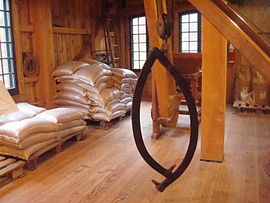
Milk and cheese
edit- See also: Cheese
Visit a place where milk, cream and other dairy products are processed and sold.
Vegetable gardens
editThey are "Schrebergartens" in Germany, "dachas" in Russia, or vegetable garden plots and simple country homes where city dwellers plunge their hands into the soil on the weekends. It's possible to rent these allotment gardens in many countries as an alternative stay to a hotel or youth hostel. There is no central directory or database for finding allotment garden lodging; the information must be ferreted out of the various national and regional agritourism bureau websites.
- Ruralis — A consortium of rural and agritourism boards in Istria, Croatia. The Roman Emperors used to reward their legionaries with "latifundia", or little stone farm houses and garden plots. You can still stay in a handful along the Dalmatian Coast.
Heritage Gardens — Legacy or heritage gardens preserve the biodiversity of heirloom vegetables that may have fallen out of favor.
- Medicinal Plants and Vegetable Gardens — List of herb garden and vegetable garden museums in Wallonia, Belgium from the Belgium Tourism Office.
Grain production
edit- Society for the Preservation of Old Mills — With the colorful acronym of SPOOM, this organization offers visitor information on historic watermills, stone windmills and grist mills throughout the U.S.
- Native Seeds — In an effort to preserve agricultural genetic diversity, this nonprofit group seeks out rare heirloom seeds adapted to the arid climate of the Southwestern U.S. and Northwestern Mexico. The group needs volunteers to help out on their conservation farm near Patagonia, Arizona. Tasks include weeding, repairing equipment, planting and harvesting.
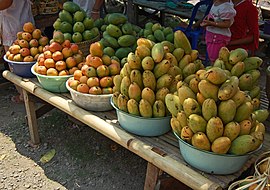
Orchards
edit- Trat — This Thai province is famous for its array of seasonal fruits such as durian, mangosteen, rambutan, Long Kong, santol and zalacca, which are available right from the orchard.
- Sukhothai Cycling Route Through the Orchards — Also in Thailand. Enjoy cycling around and tasting a variety of fruits like pomelo, santol, sapodilla, coconut, star fruit, various kinds of bananas, as well as the tasty and fleshy plum mango (Bouae Macrophylla) with its chicken-egged size.
Ground fruits
edit- Malang — In East Java, Indonesia. See tea, orange, apple, strawberry, vegetables in Lawang and Batu highlands
- Kanchanaburi — In Thailand. Province features seedless raisin vineyards, as well as a mixed cultivation farm with organic vegetables and plants of various kinds of processed agricultural products such as corn milk, vegetable juice, dehydrated banana and jack-fruit.
Maple sugar
editCelebrated in places like New England and Eastern Canada. In Quebec, February marks the maple syrup festivities in the sugar shacks, as the maple trees awaken from the winter cold and prepare for the forthcoming springtime. These "cabanes à sucre" often feature restaurants serving maple syrup-inspired cuisine.
Coffee
edit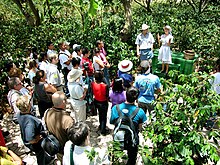
Coffee makes mornings possible, and coffee plantations on sun-drenched mountains grow the beans that make your morning cup possible. Traditional coffee plantations often offer tours or tastings.
- Colombia is probably the world's most famous coffee producer and its Zona Cafetera is a recognized
 UNESCO World Heritage Site in the heart of the Andes. You can visit plantations, see how the beans are grown, harvested, and roasted, and enjoy a cup on the tour. Some plantations have traditional haciendas and offer rooms for overnight guests.
UNESCO World Heritage Site in the heart of the Andes. You can visit plantations, see how the beans are grown, harvested, and roasted, and enjoy a cup on the tour. Some plantations have traditional haciendas and offer rooms for overnight guests. - Costa Rica has several coffee plantations offering tours and tastings. In the Central Valley (near San Jose are Cafe Britt (with a 1-1/2 tour and a 6-hour tour) and Hacienda Alsatia (Starbucks). In the Central Pacific (Costa Rica) region, near Monteverde, Don Juan offers several tours daily that also feature chocolate and sugar cane in addition to coffee. In Guanacaste, the Tío Leo Coffee Tour is offered from 8am - 11am.
- Jamaica is famous for its Blue Mountain coffee, grown in a small area at an altitude of 3,000 - 5,5500 feet. The Craighton Estate in Irish Town St Andrew offers tours and tastings.
- Mexico has three main coffee growing regions in the states of Veracruz, Chiapas, and Oaxaca. Coffee plantations with tours in Oaxaca include Pluma Hidalgo, Finca Copalita, Finca el Pacifica, Finca La Gloria, and Finca las Nieves. In Chiapas, Finca Hamburgo offers coffee tours and tastings, they also have rooms for overnight guests. Finca Argovia also offers tours, tastings, and overnight accomodations. Finca Irlanda stresses sustainable practices with eco-friendly growing practices. That's not necessarily unique though. Mexican coffees are almost always certified-organic and appeal to a knowledgable, eco-friendly buyer. In Veracruz (state), coffee growing centers on the town of Coatepec, which is famous for its Mexican Altura coffee. Several local fincas offer coffee tours and tastings.
Wine
editWine is the most sophisticated beverage (according to wine-drinkers!), and winemaking has thousands of years of tradition around the Mediterranean Sea.
Animal husbandry
edit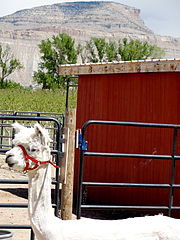
Alpaca or llama
editThese pack animals from South America are now raised around the world. Many farms offer tours and sell clothing made from the animal’s lightweight, insulating wool.
Horses
editPoultry
editGoats and sheep
editFish farms and aquaculture
editFarm sanctuary
editFalconry
editMarkets and festivals
editAgricultural shows
editAn agricultural show is a public event exhibiting the equipment, animals, sports and recreation associated with agriculture and animal husbandry. The largest comprise a livestock show (a judged event or display in which breeding stock is exhibited), a trade fair, competitions, and entertainment. The work and practices of farmers, animal fanciers, cowboys and zoologists may be displayed. The terms agricultural show and livestock show are synonymous with the North American term county fair or state fair.
Agricultural shows are an important part of cultural life in small country towns, and popular events in larger towns and cities. Shows range from small events in small country towns usually lasting two days, through medium-sized events of three days, to large Royal Shows, which may run for up to two weeks and combine elements of an amusement park with those of an agricultural show. Although increasingly under pressure due to finances and insurance concerns, all main towns in the United Kingdom have a Show Society and in some areas, several towns and villages in the area all have an annual show. Larger shows often include live entertainment and fireworks in the main arena.
Farm stands
editFarmer's markets
edit- National Farmers' Retail & Markets Association (FARMA) — A co-operative of farmers, producers selling on a local scale, and farmers markets in the United Kingdom. Info on farmers' markets, farm shops, or pick your own farms in the U.K.
Pick it yourself farm
editDestinations
editNorth America
editCanada
Alberta
British Columbia
Manitoba
Quebec
United States of America
|
Alaska Alabama
Arkansas California Colorado Delaware Georgia
Hawaii
Idaho Illinois
Iowa Kansas Kentucky Maine
Maryland
Massachusetts Michigan Minnesota |
Missouri New Hampshire New Jersey New Mexico New York North Carolina
North Dakota
Oklahoma Oregon Ohio
Pennsylvania Tennessee Texas
Vermont Washington Wisconsin Wyoming |
Europe
editThe European Federation of Rural Tourism
AustriaeditBelaruseditBelgiumeditBulgariaeditCypruseditDenmarkeditEstoniaeditFinlandeditFranceeditGermanyeditIcelandedit
Irelandedit
|
ItalyeditLatviaeditLithuaniaeditThe Netherlandsedit
Portugal / MadeiraeditRomaniaedit
Spainedit
SwedeneditTurkeyedit
United Kingdomedit
|
South America
edit- Brazil - Associação Brasileira de Turismo Rural[dead link]
Asia
editIndia
Oceania
edit- Australia - www.agritours.com, www.caloundraaccommodation.com
- New Zealand - www.ruraltours.co.nz
Stay safe
edit
During a visit to a working farm or ranch, you will most likely encounter farm equipment and animals. Supervise your children around both and encourage them to use some restraint. Any visit to a rural area may include mud and manure, so wear boots or old sneakers. Beware of pests.


